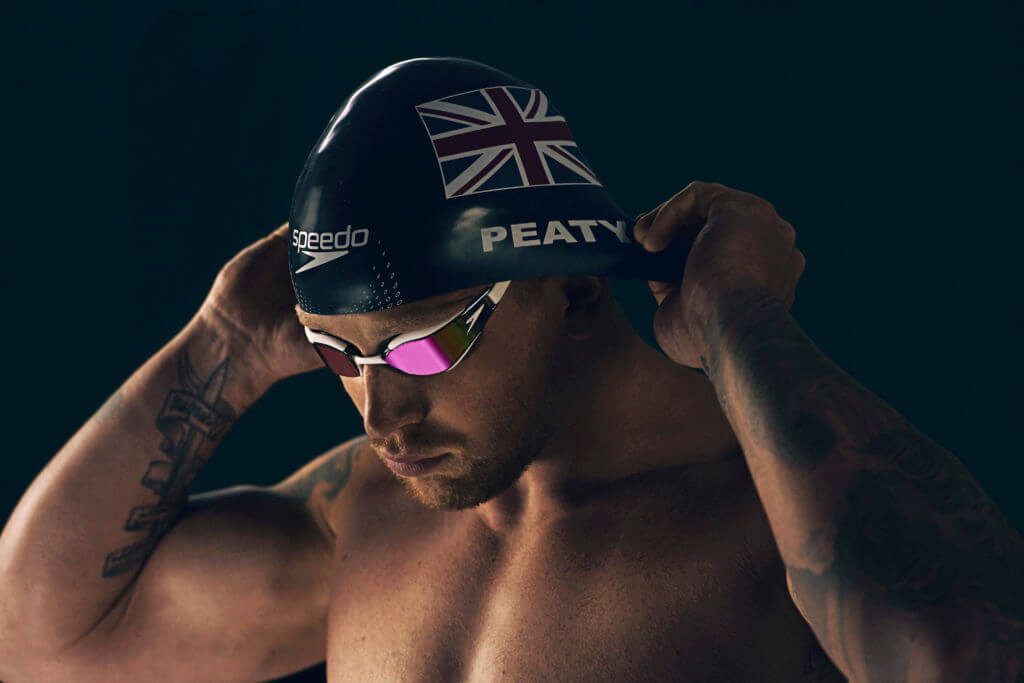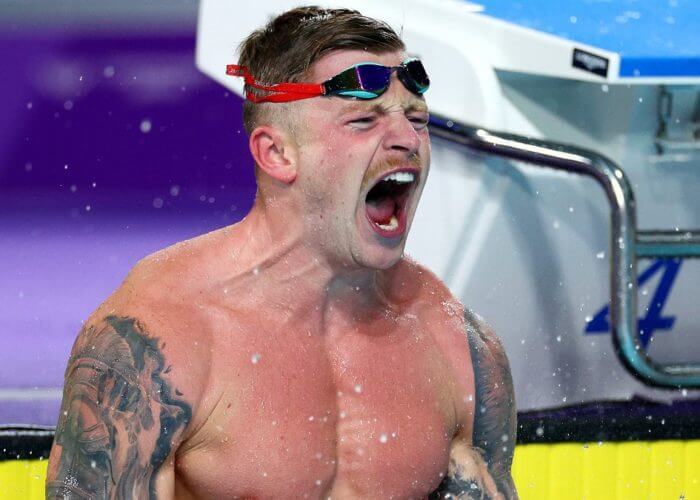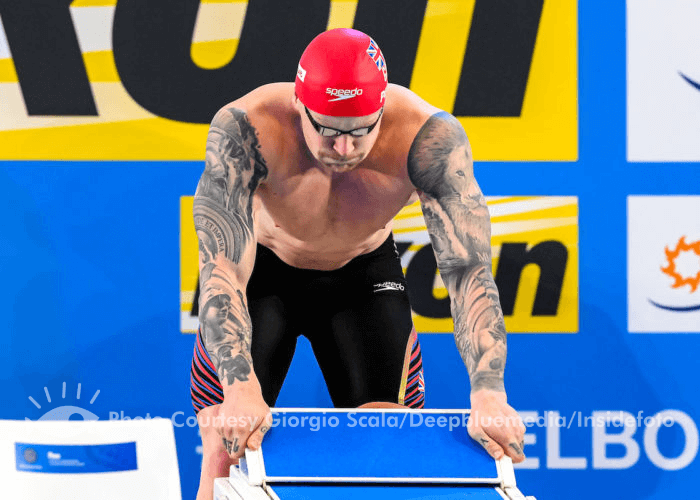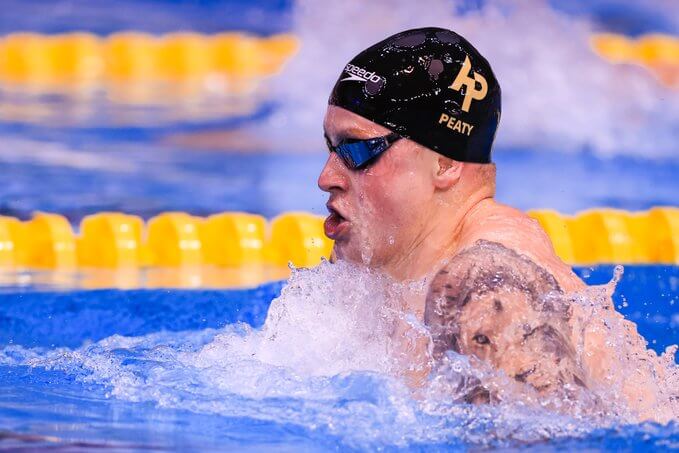The Road to Paris: Refocused, Adam Peaty Ready to Attack British Olympic Trials

The Road to Paris: Refocused, Adam Peaty Ready to Attack British Olympic Trials
Five months ago, Adam Peaty freely admitted he had considered quitting “a thousand times.” Physical and mental exhaustion following years of heavy training and competition—as well as upheaval in his personal life—conspired to send the two-time Olympic 100-meter breaststroke champion into a spiral in early 2023. Such was the severity of his isolation and loneliness that Peaty turned to alcohol—on the brink of walking away from swimming after 14 years of a strict regimen fundamental to his success and domination. Fast-forward to February 2024…and Peaty was back on the podium, winning double bronze at the World Championships in Doha.
From the March Digital Issue of Swimming World
Since he won his first senior international title at the 2014 Commonwealth Games in Glasgow, Adam Peaty has swept all before him:
The only British swimmer to have defended an Olympic title…Five Olympic medals…Eight world titles…The quadruple-quadruple—16 races, 16 golds—at Europeans…Four Commonwealth golds…A world record of 56.88 in the 100-meter breaststroke and 25.95 in the 50 breast.
But it had all taken its toll.
He stepped away from the intensity of the only life he had known since he was 14 and confronted life past and present head-on, with distance enabling him to see that his body and mind were not aligned.
He let go of trying to affect things outside his control and instead focused on those who mattered most: son, George; partner, Holly; family, friends and Team Peaty; and long-term coach, Mel Marshall, prominent among them.
Energized by his glimpse into another life, he reflected and re-evaluated his life and priorities.

Photo Courtesy:
He realized the burden that self-imposed pressure had brought and the cost of the emotional energy required.
“We used to want to win at all costs, and we still do—I think that cost can still be hard work and sacrifice—they are the two pillars of elite sport, right?” he told Swimming World last year.
“Back then it was more—any cost, I want to do it.”
In March last year, Peaty decided to stop for good…or at least return to the sport with a different approach, one that is far healthier for both body and mind.
Neither did he want to live with any regrets or ask himself, “What if?” further down the road, a question all-consuming in its destruction and self-blame.
“A lot of people in the sport—because it isn’t kind to older athletes in so many ways—they hang it up, and that’s their legacy done,” he said.
“But for me, it just didn’t sit right that I would have done that.
“And I think the pain of losing is nothing compared to the pain of regret, so for me I’ve got to accept that challenge, and I’m working really hard in and out of the pool to facilitate that.”
BACK TO THE POOL
Peaty returned to competition at the World Cup in October 2023, his first outing in international long-course waters since the 2022 Commonwealth Games.
Awaiting were the likes of Arno Kamminga and Nicolo Martinenghi—who won silver and bronze, respectively, behind Peaty at the Tokyo Olympics—as well as Qin Haiyang, who won an historic breaststroke treble at the 2023 World Championships in Fukuoka.
Speaking ahead of his return, Peaty said: “To be honest, I’m not bothered about the medals or the gold.
“For the first time in my life, I’m bothered about the challenge to myself, to prove to myself that I can come from the lowest point of my career—even though I had all the golds and all the world records…and I know how that felt.
“But now I’m just going to come back and give myself the challenge and give myself one huge opportunity to get the best out of myself—in all areas of my life.”

Photo Courtesy: Giorgio Scala / Deepbluemedia / Insidefoto
Third in the 50 (26.98) and sixth over 100 meters (59.85) at the first stop in Berlin was followed in Athens by second in the 50 (26.89) and sixth once more over two lengths in 59.98.
At the final stop of the tour in Budapest—at the same Duna Arena in which he set the 50 world record at the 2017 World Championships—Peaty was second in the 50 (26.79) and fourth in the 100 (59.25).
It was another step well taken by Peaty as he ventures down new paths, in and out of the pool.
Peaty turned 29 in December, and days later, the ringing of the bells heralded an Olympic year.
With the World Championships on the horizon, he started 2024 with a training camp in Thailand—which he described as one of the hardest he’s ever done—before flying to Doha.
It was his first Worlds since Gwangju 2019, when he set that 56.88 WR, thereby accomplishing Project 56—the pursuit of the first sub-57-second performance in the history of the 100 breaststroke.
“There’s no other word except for ‘incredible,’” Peaty said at the time. “I’ve been chasing that goal for three years now. Ever since I touched that wall in Rio, I was like, ‘I could go faster.’”
ROUSING RECEPTION IN DOHA
Peaty was 24 in Gwangju, and much has happened to him since then. In his absence, the landscape of his events has changed.
While the Briton still owns the top-14 times in history over 100 meters, Qin crashed in at 15th with a 57.69 to win the 2023 title, a time he repeated at the Asian Games in September.
China’s new superstar went seventh all-time over 50 meters—behind Peaty’s top six efforts—with a winning time of 26.20 in Fukuoka.
Qin has astonishing consistency. The breaststroke sweep in Japan was replicated weeks later at the World University Games and then the Asian Games.
While he bypassed Doha, Nic Fink, Kamminga and Martinenghi all awaited at the Aspire Dome in Qatar, where Peaty was given a rousing reception.

Photo Courtesy: British Swimming
He posted his fastest time since Tokyo when he went 58.60 to lead the 100 semis, and said, “It was just about going out there and showing a little bit of Adam Peaty, which is a front end, getting a little bit angry with myself like I normally do.”
Peaty had never been beaten at Worlds, but it was Fink who claimed gold in the 100 finals (58.57), with the Briton third in 59.10 and Martinenghi second in 58.84.
Afterward, Peaty said: “(It was) bittersweet because we didn’t come here for medals. You’ve got to get that balance right. My happiness now in the sport comes from knowing I couldn’t have done anything more, and tonight I knew I could have done something more.
“But I said out there that if I’d got what I wanted tonight—and maybe it would have equaled the best possible performance I could have done here—maybe that would have been just as dangerous as not getting what I wanted, because this is going to push me.”
“HUNGER IN THE BELLY”
There were further hints ahead of the 50 final that Peaty was looking to rediscover that inner athlete that conquered the world.
“It’s going to be about how can I get that guy who wins medals out, because he was missing for the 100-meter final…a bit too peaceful.
“These learnings will help me for the rest of my life, but I’m still an athlete, and I’ve still got to learn that personality—but you’ve still got to be aggressive.”
He was fourth in the 50 in 26.77, as Sam Williamson of Australia won in 26.32, joining Ilya Shymanovich of Belarus as third-fastest all-time. Peaty completed his meet with a 59.42 breaststroke leg as Great Britain took bronze in the mixed medley relay.
Following the competition, Peaty posted to social media, saying: “A great few days racing in Doha. Coming away with some vital learnings and good results for this time of year…and more hunger in the belly.”
* * *
Peaty was unrested for Doha, coming off the back end of a tough training camp. Can he get back to the low-57s, where he’ll in all likelihood need to be if he is to do the three-“Peat(y)”?
Where he’s at will become clear at the British Olympic Trials in London from April 2-7.
But he has come back from the depths of loneliness—despite all the gold and the glitter—and found himself happier, calmer…and back on the podium.
It has been a voyage of discovery for Peaty, who said a few months ago: “For me now, it’s like I’ve got to take the medals and I’ve got to take the world records away from my vision because it just distracts me from who I am, what I am and what I’m trying to do.
“Now I think I’m like—you know what?—I want to be the best possible athlete and the best possible person along the next (several) months as I possibly can be.”



